Oct 22, 2018 - The Twenty-Second Annual Carls-Schwerdfeger History Lectureship featured Dr. Melvyn Leffler, Edward Stettinius Professor of History at the University of Virginia, who spoke about the Cold War in two lectures at Union University on October 22, 2018.
In his afternoon lecture to some 130 people on “Harry Truman and the Origins of the Cold War,” Leffler stated that very few people in the summer of 1945 foresaw the Cold War that would emerge in the aftermath of World War II. The Cold War happened largely because of geopolitical, economic, and ideological factors intertwined with fears. The United States was the world’s only global power militarily and economically at war’s end. Europe meanwhile faced a massive reconstruction effort at a time when there was considerable disillusionment with liberal capitalism among its peoples, who blamed it for the two world wars and the Great Depression. Europeans wanted an improvement of their lives through government action, and it was leftist parties, including the Communists, that stood for an interventionist state. U.S. policymakers feared that leftist political victories across Europe would result in linkups with the Kremlin and eventual Soviet domination of much of Europe and Asia. American President Truman’s fears were reinforced by Communist power grabs in Eastern Europe, strong Communist parties in France and Italy, civil wars involving Communists in Greece and China, and Soviet pressure on Turkey over control of the Turkish Straits. Compounding Truman’s problems was a Republican Party election victory in the 1946 Congressional elections, giving the Republicans control of both the House and Senate. To rally Republican support in 1947, Truman launched an anti-Soviet crusade in a March speech to Congress. With Congressional support, he mobilized U.S. power and wealth through the adoption of the Truman Doctrine to provide military assistance to Greece and Turkey and even more importantly the Marshall Plan to accelerate the economic recovery of Western Europe. Truman also changed U.S. occupation policies in West Germany and Japan from punishment to reconstruction. The Cold War was locked into place by 1948-1949, with each side believing that the other would eventually collapse under the weight of its ideological contradictions. In his conclusion, Leffler stated that “Truman played his cards well,” in large part by calculating that Soviet leader Joseph Stalin would not resort to war over Truman’s foreign policy moves and by giving considerable importance to the economic reconstruction in Europe after World War II.
Leffler’s evening lecture, attended by 700 people, was on “Ronald Reagan and the End of the Cold War.” In looking at President Reagan’s role in ending the Cold War, Leffler said that it was difficult to determine what Reagan most wanted to do in dealing with the Soviet Union since he was often inscrutable and opaque. The result was the emergence of conflicting views among scholars regarding Reagan’s aims and actions in the Cold War. One interpretation argued that Reagan’s strategy was to win the Cold War through a military buildup, a contraction of Soviet expansion, and negotiation. These themes were contained in two national security directives approved in mid-1982 and early 1983. Subscribers to this view claimed that Reagan was a master strategist whose national security adviser in the early 1980s imposed discipline on feuding bureaucrats and orchestrated a toughminded strategy that eventually triumphed over the Kremlin. Leffler pointed out that recently declassified evidence raised doubts about the soundness of this view. As for the claim of some advisers that Reagan’s Strategic Defense Initiative won the Cold War, Leffler cited Soviet documents that disproved this notion. While stating that SDI was not without importance, Leffler labeled it a secondary factor in influencing the decision-making of Mikhail Gorbachev, who became the Soviet leader in 1985. According to Leffler, Reagan was eager to negotiate with the Soviets after Gorbachev took power. This was due to Reagan’s fear of nuclear war, his wish to eliminate nuclear arms, and his desire to end the Cold War. Reagan was a master of friendly diplomacy who brought self-confidence, conviction, sincerity, and affability to the negotiating table. A turning point in U.S.-Soviet relations came at the end of the Reykjavik Summit Conference when Gorbachev, deeply affected by Reagan’s conviction about abolishing nuclear weapons, concluded that things would ultimately work out between them. Reagan became Gorbachev’s indispensable negotiating partner, establishing a relationship that set the stage for the unanticipated, breathtaking changes that followed Reagan’s presidency and that culminated in the collapse of the Soviet Union. In the end, by engaging Soviet leadership and seeking to end the Cold War, Reagan helped the United States win it.
In addition to his two lectures, Leffler attended a dinner in his honor and, following his evening presentation, signed copies of his books A Preponderance of Power: National Security, the Truman Administration, and the Cold War and For the Soul of Mankind: The United States, the Soviet Union, and the Cold War.
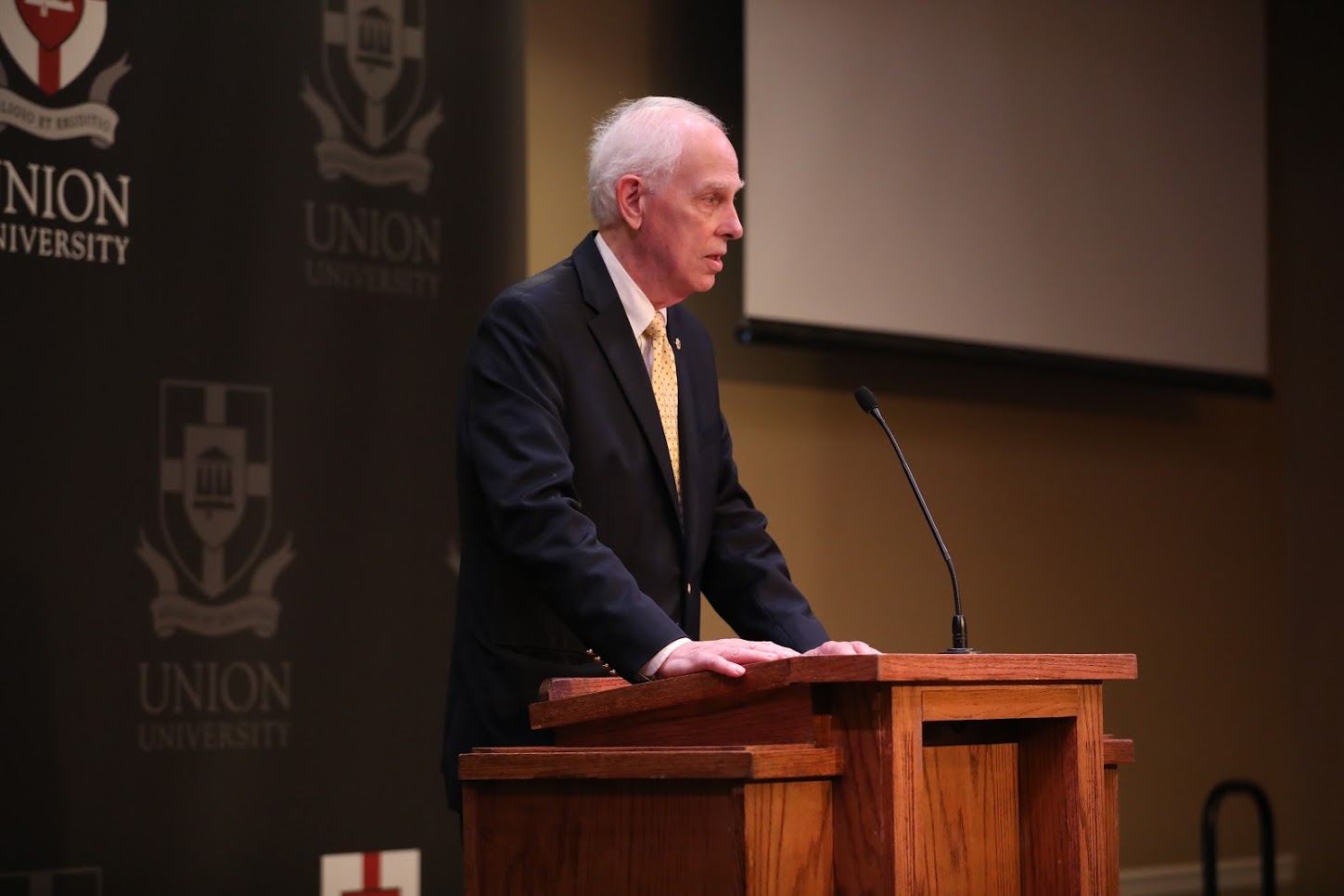 Dr. Stephen Carls introduces Dr. Melvyn Leffler at the afternoon lecture of the 2018 Carls-Schwerdfeger History Lectureship on October 22. Photo by Kristi Woody
Dr. Stephen Carls introduces Dr. Melvyn Leffler at the afternoon lecture of the 2018 Carls-Schwerdfeger History Lectureship on October 22. Photo by Kristi Woody
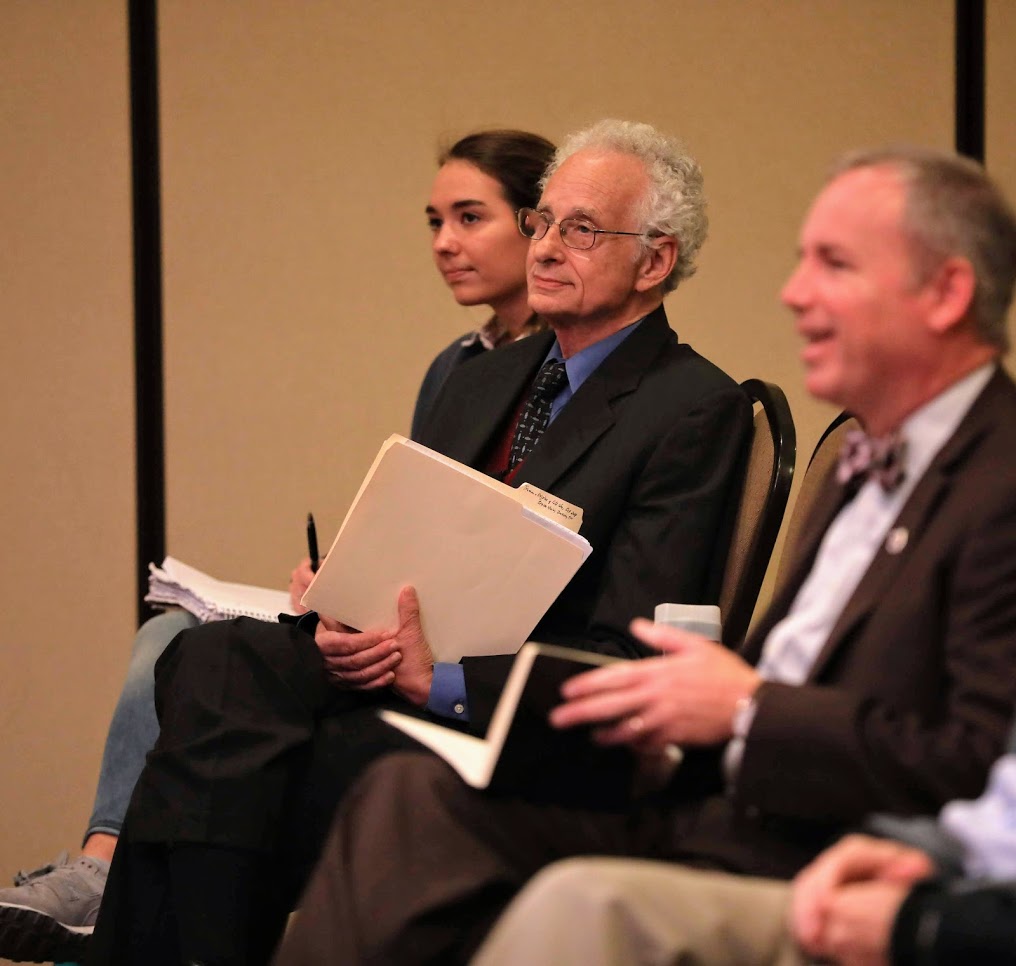 Dr. Melvyn Leffler listens to Dr. Stephen Carls' introduction of him at the afternoon lecture of the Carls-Schwerdfeger History Lectureship on October 22, 2018. Photo by Kristi Woody
Dr. Melvyn Leffler listens to Dr. Stephen Carls' introduction of him at the afternoon lecture of the Carls-Schwerdfeger History Lectureship on October 22, 2018. Photo by Kristi Woody
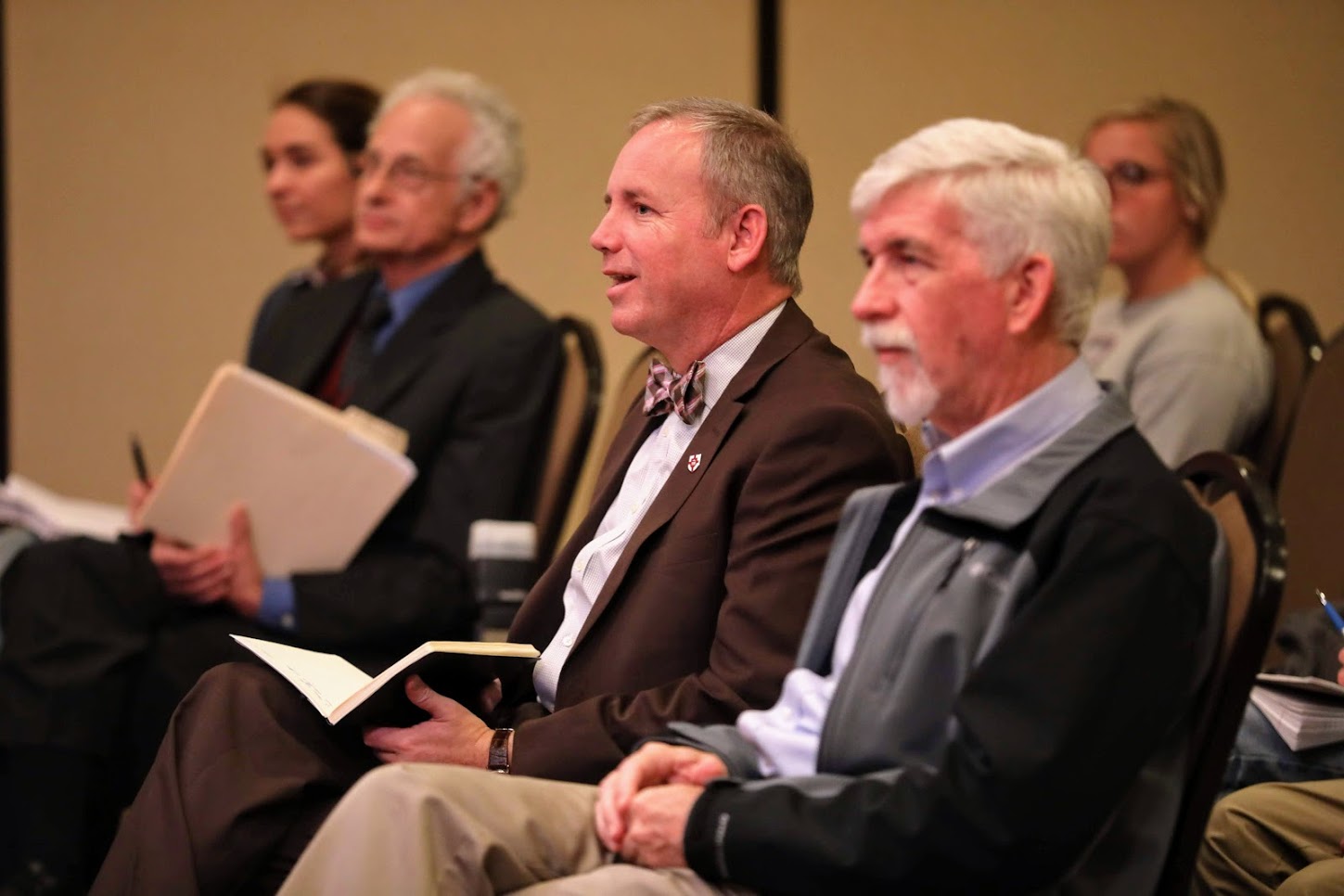 Drs. Samuel W. "Dub" Oliver (second from right) and Bill Nettles (right) attend the afternoon lecture of Professor Melvyn Leffler on October 22, 2018. Photo by Kristi Woody
Drs. Samuel W. "Dub" Oliver (second from right) and Bill Nettles (right) attend the afternoon lecture of Professor Melvyn Leffler on October 22, 2018. Photo by Kristi Woody
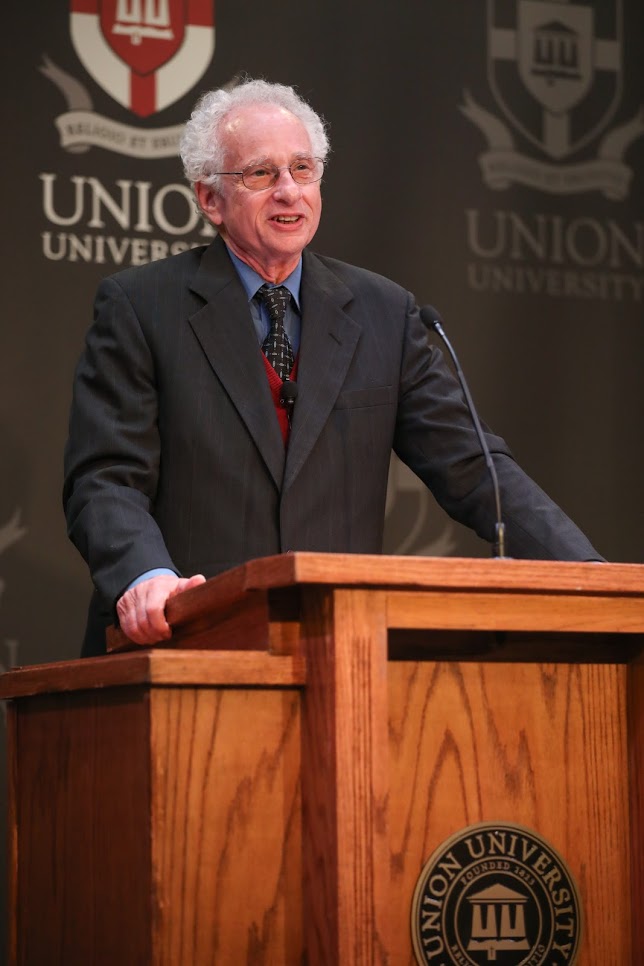 Dr. Melvyn Leffler delivers his afternoon lecture on "Harry Truman and the Origins of the Cold War" as the Carls-Schwerdfeger History Lecturer on October 22, 2018. Photo by Kristi Woody
Dr. Melvyn Leffler delivers his afternoon lecture on "Harry Truman and the Origins of the Cold War" as the Carls-Schwerdfeger History Lecturer on October 22, 2018. Photo by Kristi Woody
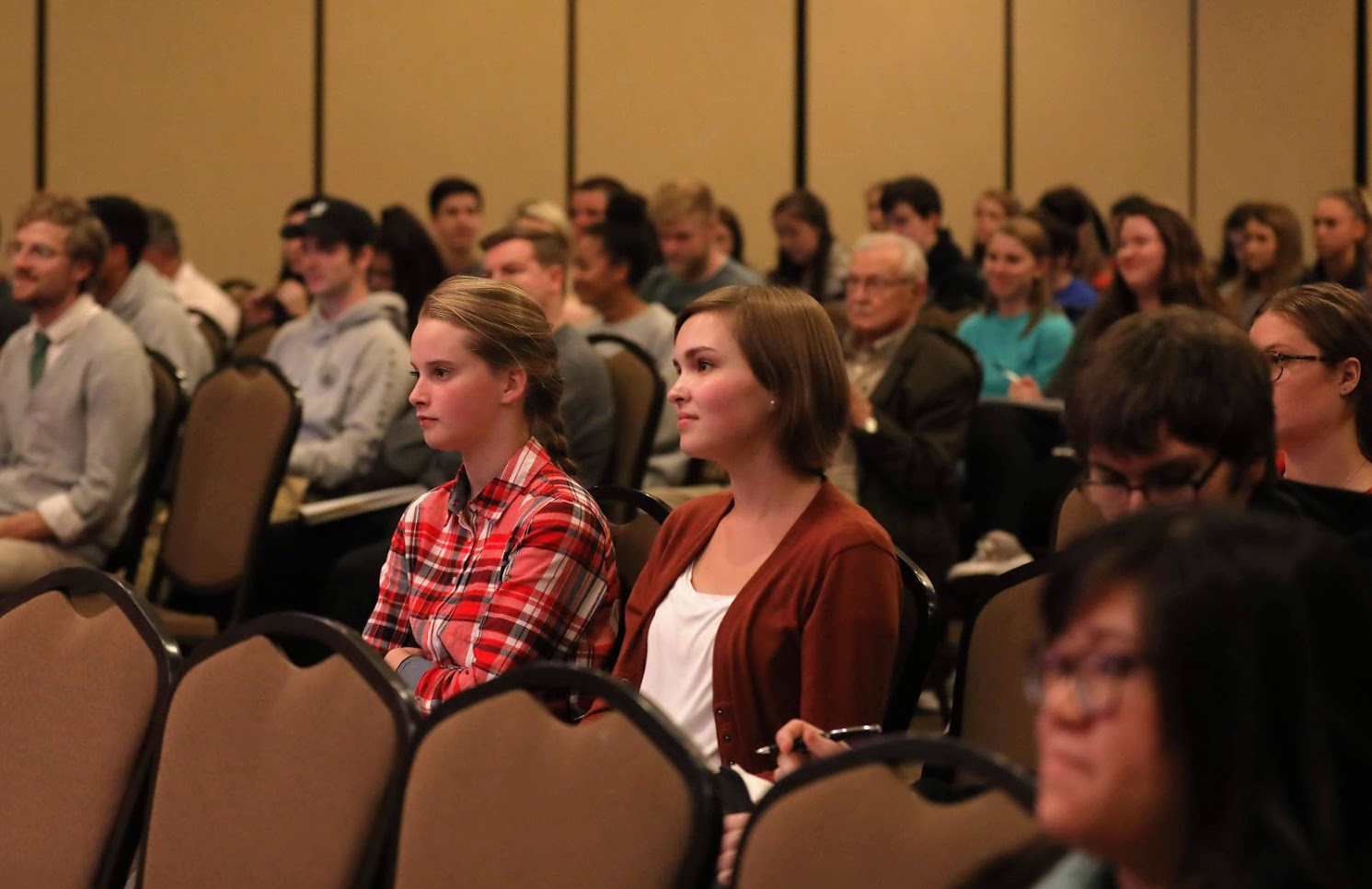 Attendees listen to Professor Melvyn Leffler speak on "Harry Truman and the Origins of the Cold War" as the Carls-Schwerdfeger History Lecturer on the afternoon of October 22, 2018. Seated in the second row are Katie Simpson (third from right) and Peytyn Moses (second from right). Photo by Kristi Woody
Attendees listen to Professor Melvyn Leffler speak on "Harry Truman and the Origins of the Cold War" as the Carls-Schwerdfeger History Lecturer on the afternoon of October 22, 2018. Seated in the second row are Katie Simpson (third from right) and Peytyn Moses (second from right). Photo by Kristi Woody
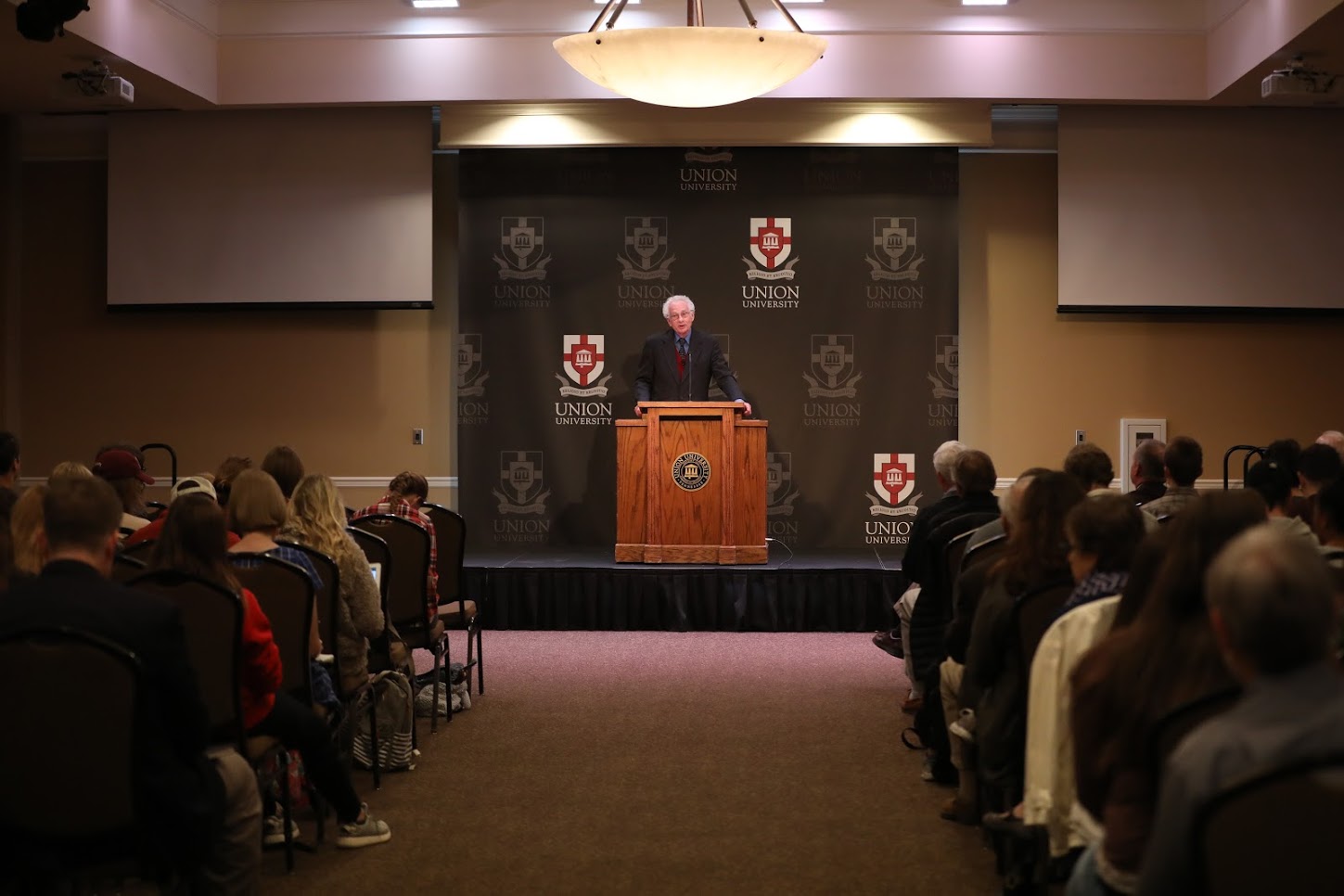 Professor Melvyn Leffler speaks on "Harry Truman and the Origins of the Cold War" to some 130 people as the 2018 Carls-Schwerdfeger History Lecturer on the afternoon of October 22, 2018.
Professor Melvyn Leffler speaks on "Harry Truman and the Origins of the Cold War" to some 130 people as the 2018 Carls-Schwerdfeger History Lecturer on the afternoon of October 22, 2018.
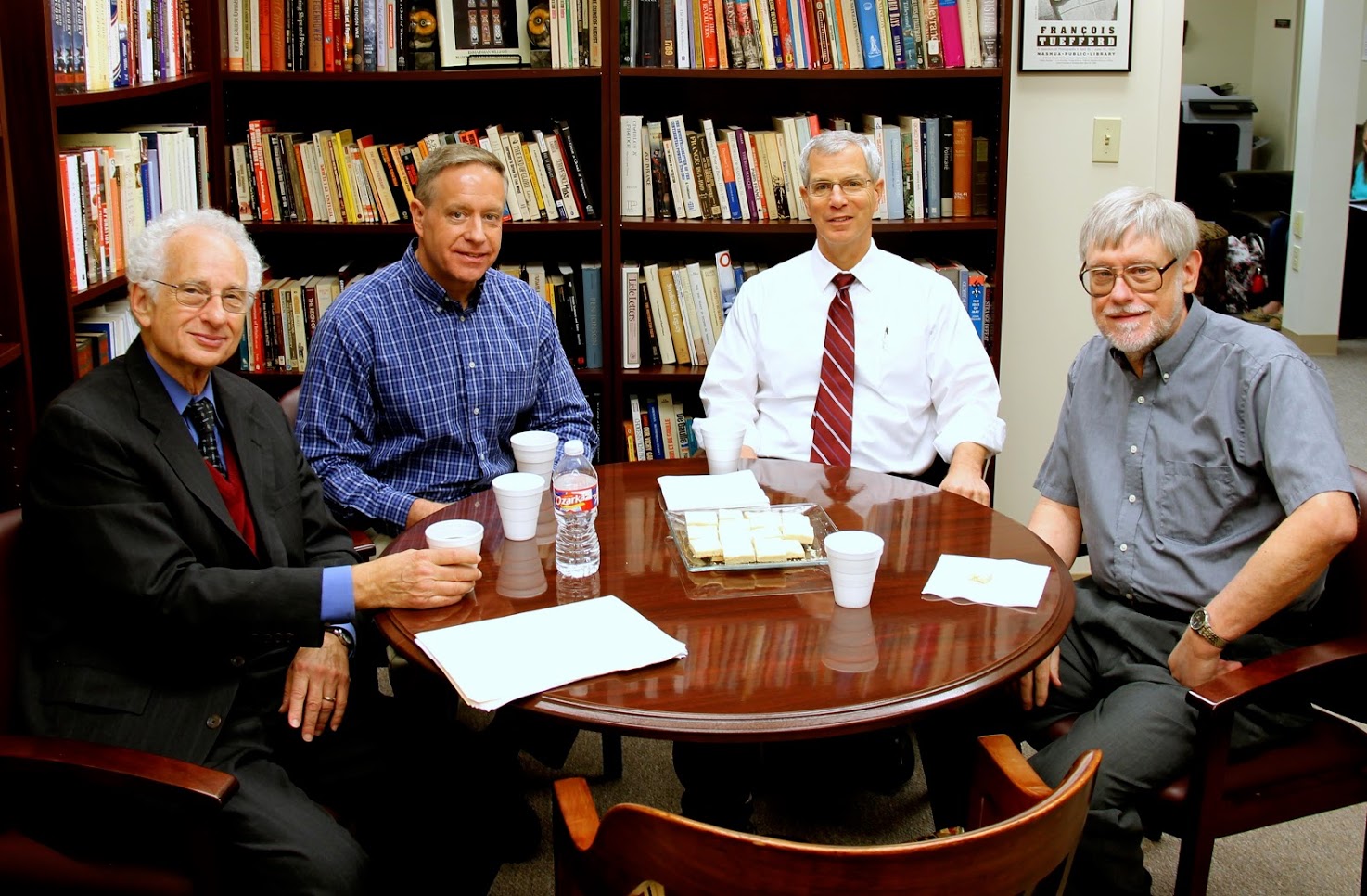 Dr. Melvyn Leffler (left), the 2018 Carls-Schwerdfeger History Lecturer, enjoys an afternoon break with history department members on October 22. They are (left to right) Drs. Henry Allen, David Thomas, and Terry Lindley.
Dr. Melvyn Leffler (left), the 2018 Carls-Schwerdfeger History Lecturer, enjoys an afternoon break with history department members on October 22. They are (left to right) Drs. Henry Allen, David Thomas, and Terry Lindley.
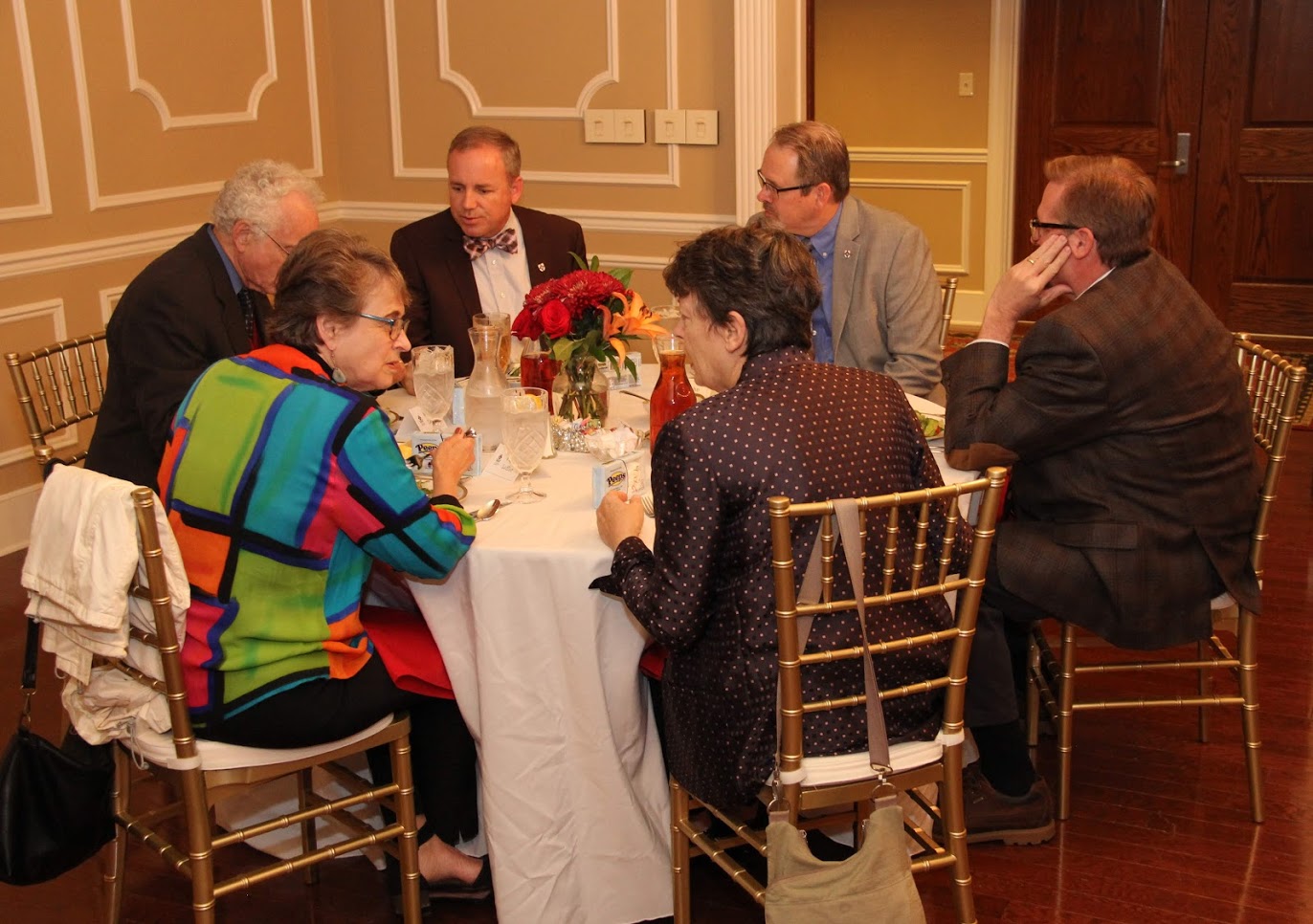 Attendees at the Carls-Schwerdfeger History Lectureship dinner in honor of Dr. Melvyn Leffler on October 22, 2018, enjoy food and fellowship together. They are (starting on the front left and going clockwise) Drs. Phyllis Leffler, Melvyn Leffler (face partially obscured), Samuel W. "Dub" Oliver, John Netland, Hunter Baker, and Alice-Catherine Carls.
Attendees at the Carls-Schwerdfeger History Lectureship dinner in honor of Dr. Melvyn Leffler on October 22, 2018, enjoy food and fellowship together. They are (starting on the front left and going clockwise) Drs. Phyllis Leffler, Melvyn Leffler (face partially obscured), Samuel W. "Dub" Oliver, John Netland, Hunter Baker, and Alice-Catherine Carls.
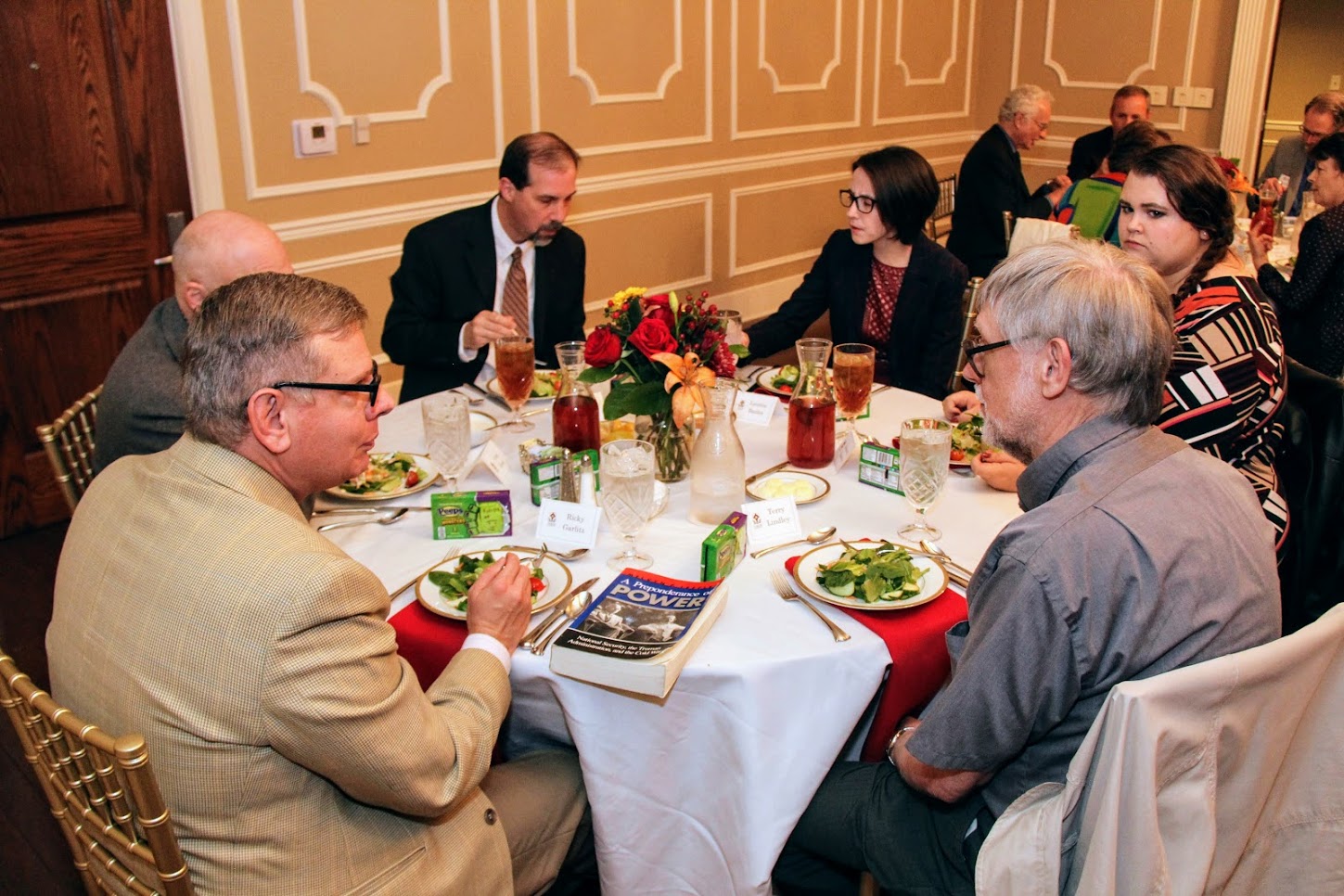 Attendees at the dinner in honor of Dr. Melvyn Leffler on October 22, 2018, engage in conversation and enjoy good food together. They are (starting on the front left and going clockwise) Dr. Ricky Garlitz, Dr. Greg Ryan (face obscured), Dr. Sean Evans, Lauren Butler, Jessica Barton, and Dr. Terry Lindley.
Attendees at the dinner in honor of Dr. Melvyn Leffler on October 22, 2018, engage in conversation and enjoy good food together. They are (starting on the front left and going clockwise) Dr. Ricky Garlitz, Dr. Greg Ryan (face obscured), Dr. Sean Evans, Lauren Butler, Jessica Barton, and Dr. Terry Lindley.
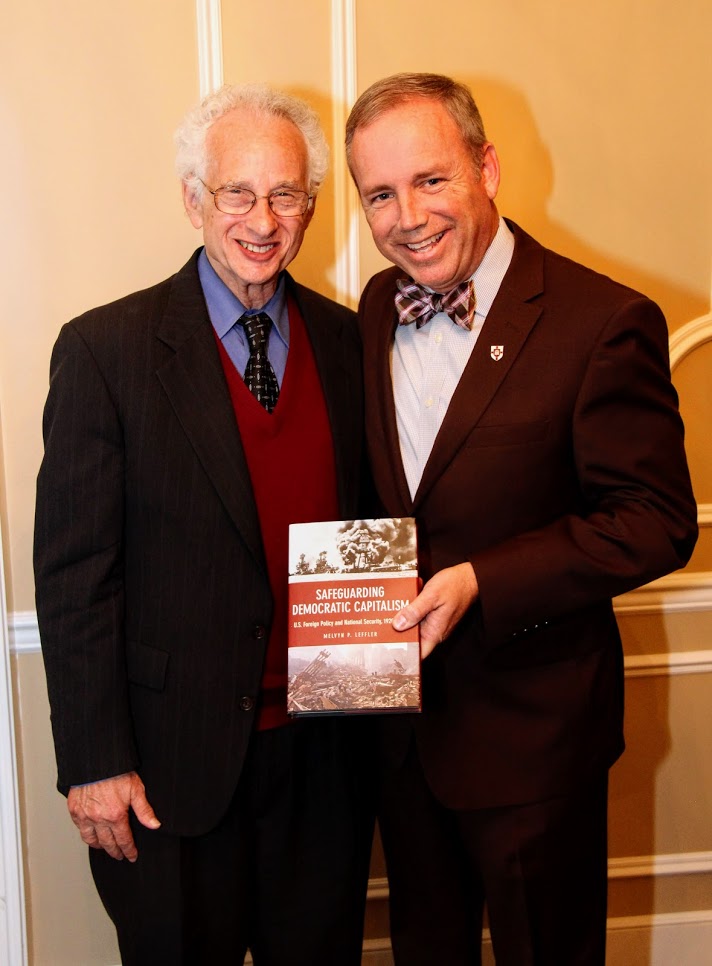 Drs. Melvyn Leffler (left) and Samuel W. "Dub" Oliver stand together after the presentation of one of Leffler's books to Union's president at a dinner on October 22, 2018.
Drs. Melvyn Leffler (left) and Samuel W. "Dub" Oliver stand together after the presentation of one of Leffler's books to Union's president at a dinner on October 22, 2018.
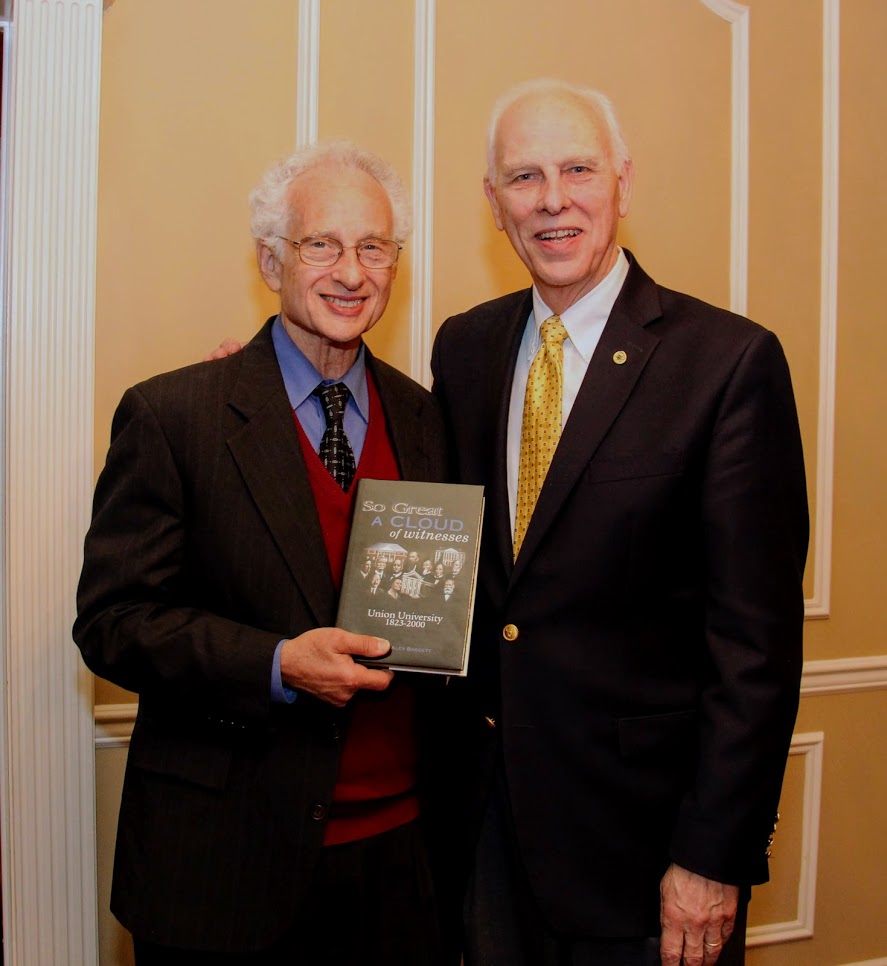 Dr. Melvyn Leffler, the 2018 Carls-Schwerdfeger History Lecturer, accepts a book from Dr. Stephen Carls at a dinner in Leffler's honor on October 22.
Dr. Melvyn Leffler, the 2018 Carls-Schwerdfeger History Lecturer, accepts a book from Dr. Stephen Carls at a dinner in Leffler's honor on October 22.
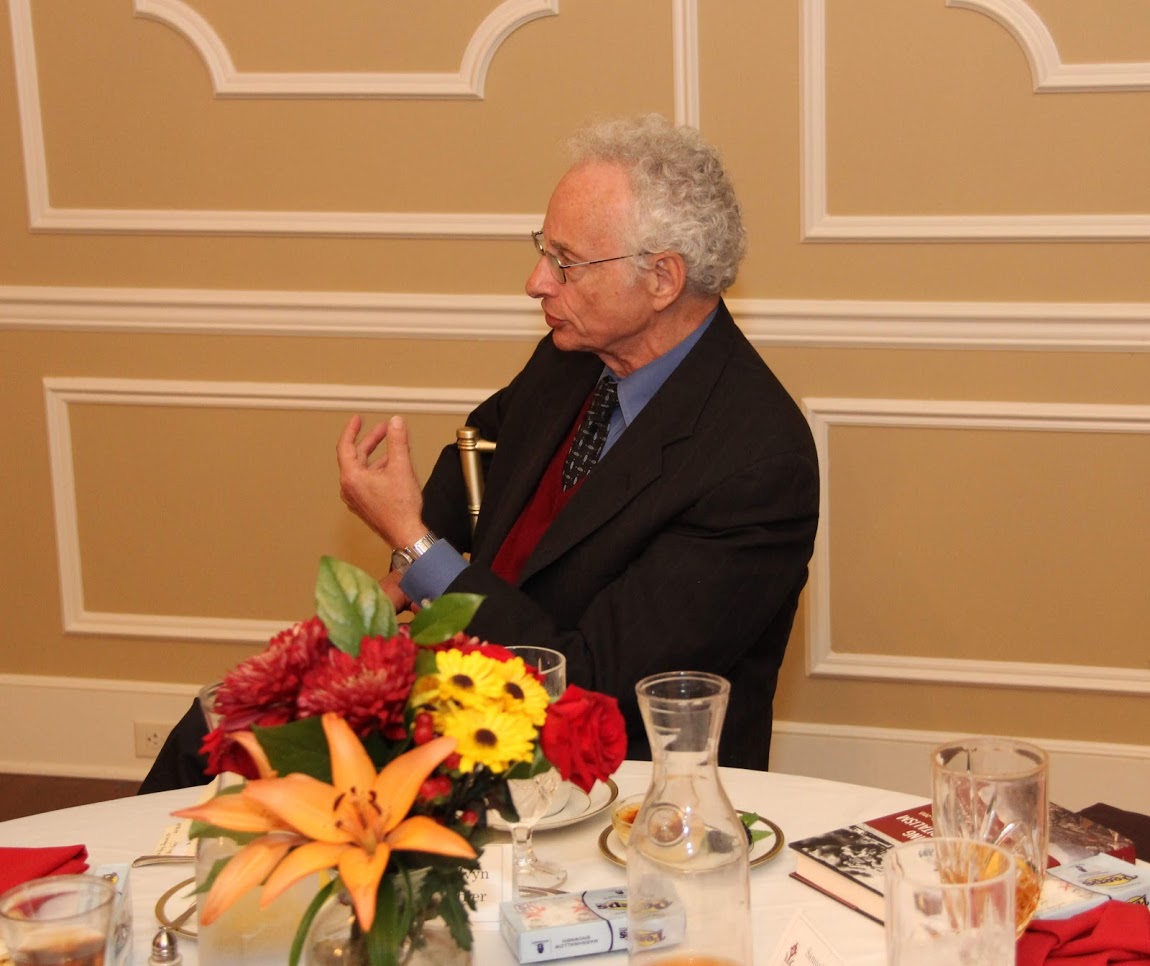 Professor Melvyn Leffler responds to a question at a question and answer time during a dinner in his honor on October 22, 2018.
Professor Melvyn Leffler responds to a question at a question and answer time during a dinner in his honor on October 22, 2018.
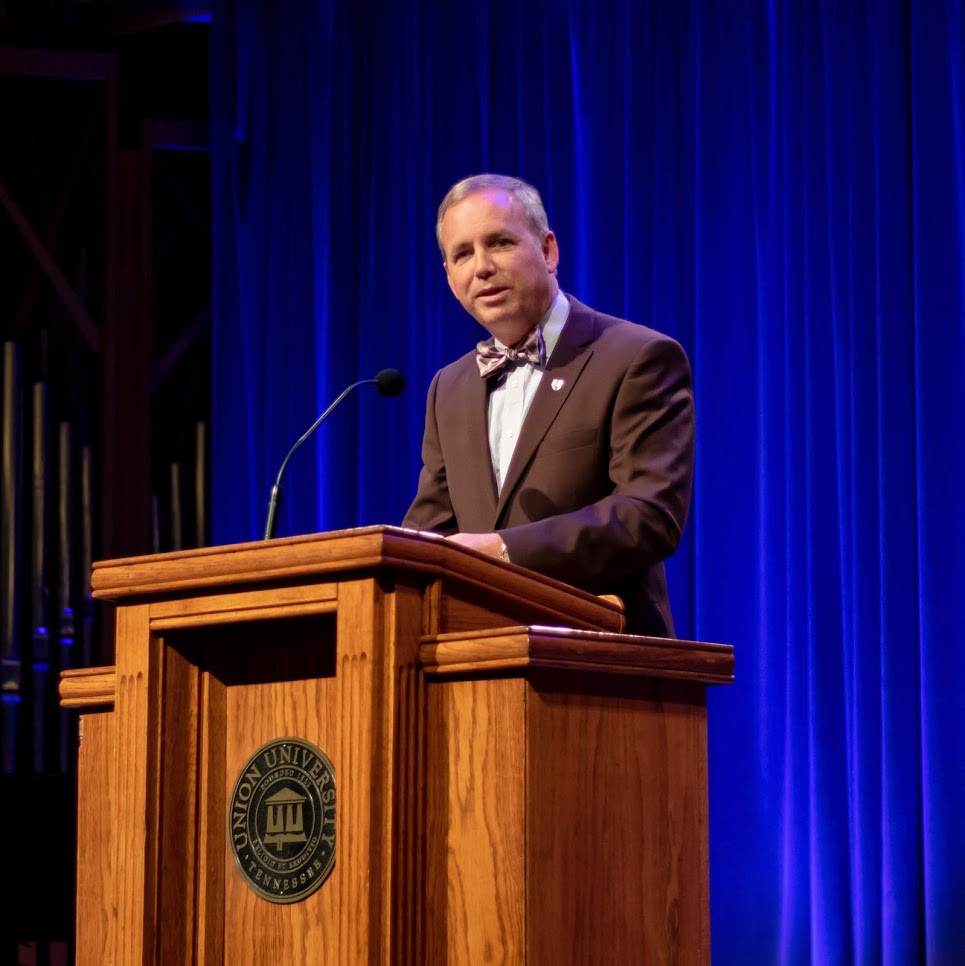 Union University President Samuel W. "Dub" Oliver welcomes attendees to the evening lecture of the 2018 Carls-Schwerdfeger History Lectureship on October 22. Photo by Joey Echeverria
Union University President Samuel W. "Dub" Oliver welcomes attendees to the evening lecture of the 2018 Carls-Schwerdfeger History Lectureship on October 22. Photo by Joey Echeverria
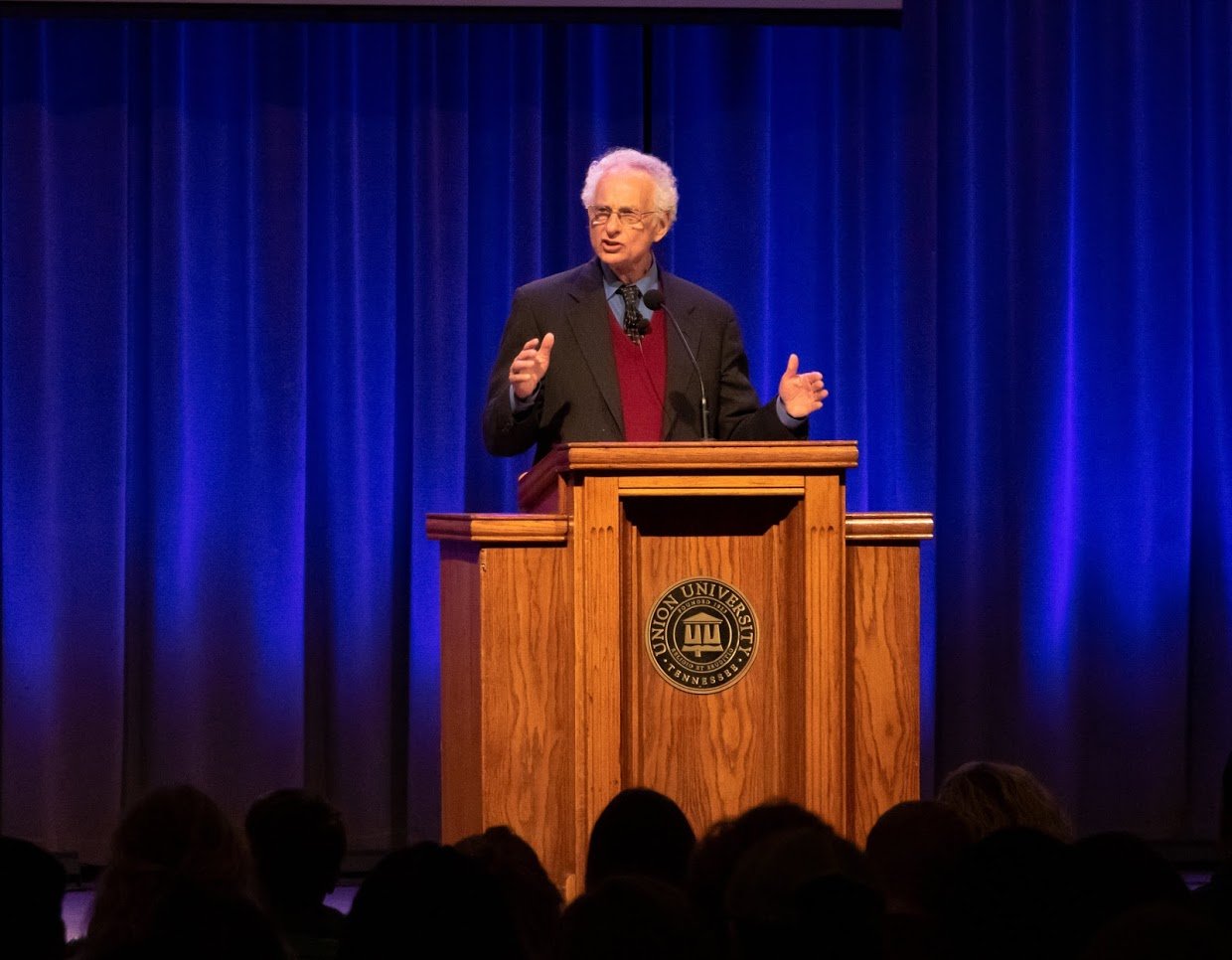 Dr. Melvyn Leffler, the 2018 Carls-Schwerdfeger History Lecturer, speaks about "Ronald Reagan and the End of the Cold War" on the evening of October 22. Photo by Joey Echeverria
Dr. Melvyn Leffler, the 2018 Carls-Schwerdfeger History Lecturer, speaks about "Ronald Reagan and the End of the Cold War" on the evening of October 22. Photo by Joey Echeverria
